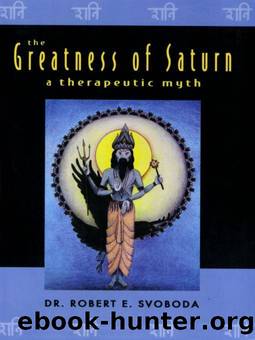The Greatness of Saturn: A Therapeutic Myth by Svoboda Robert E

Author:Svoboda, Robert E. [Svoboda, Robert E.]
Language: eng
Format: epub
Publisher: Lotus Press
Published: 1997-05-31T16:00:00+00:00
The Grahas
Prominent among the many Faces of God stand the Nine Grahas of Jyotish. Though they are usually called “planets” in English, the Nine Grahas are much more than giant balls of matter. To comprehend what these Nine Planets mean to Jyotish, it is necessary to know something of the nature of the word that describes them. Graha (“seizer”) comes from a Sanskrit root meaning “to grasp or catch hold of,” and can mean both “sense organ” (which grasps sense objects) and “hand” (which physically grasps, grabs, grips, and gropes). When you can “get a grip,” you can make good use of what life offers you, internally or externally; hence the use of the word grahani in Ayurveda to mean the small intestine, which is the organ that grasps the nutrients present in food from the outer world and conveys them within, into the circulation. Should the grahani cease its functions, the inner cosmos would lose its ability to seize physical sustenance, as the mind loses the ability to procure visual or auditory or tactile sustenance when the grahas that are the sense organs fail to perform. Those who release their grip on external reality similarly lose ‘touch’ with day-to-day life; whether inadvertently (like psychotics) or deliberately (like some solitary contemplatives) their mental “graha-ness” degenerates, for better or for worse.
Just as you, the individual, can grasp the objects in your external environment, other varieties of graha can get a grip on the internal you. Indians have for centuries used ritual to evict from themselves and their surroundings all sorts of grahas, including bhutas (literally, “has-beens”; evil spirits, and the thought forms which act like them), before commencing any work in which they hoped for success. Though some grahas are internally-generated shades, like those fixed ideas which gain purchase on one’s consciousness and refuse to let go, most are forces which originate outside the individual. A few grahas nourish us when they possess us; among these are anugraha (which literally means “to follow in grabbing”) and vigraha. Anugraba signifies “grace,” the grace of God which follows you until it grabs you and forces you to follow it into a state of holiness. A vigraha is an iconic image, a “form which enables the mind to grasp the nature of God. (Eck, p. 38) The Faces of God are all vigrahas.
Other grahas enter your reality as ethereal parasites. These grahas, like the worms, bacteria, and viruses which are our physical parasites, possess us to feed off us; they deplete and devour us whenever they temporarily gain control over us. Ayurveda devotes one of its eight limbs to the treatment of these astral bloodsuckers, and the Ayurvedic author Sushruta considers parasitical grahas in detail in the chapter of his treatise entitled “Prevention of the Non-Human.” Among the myriads of potential possessors are the Bala Grahas, which can enter and affect susceptible children. Though the Bala Grahas are not the Planetary Grahas, they are some of the instruments through which the Nine Planets seize.
Download
This site does not store any files on its server. We only index and link to content provided by other sites. Please contact the content providers to delete copyright contents if any and email us, we'll remove relevant links or contents immediately.
Fingersmith by Sarah Waters(2011)
Kundalini by Gopi Krishna(1824)
The Bhagavad Gita by Bibek Debroy(1668)
Indian Mythology by Devdutt Pattanaik(1624)
Wheels of Life by Anodea Judith(1609)
The Yoga of Jesus: Understanding the Hidden Teachings of the Gospels by Paramahansa Yogananda(1528)
The Man from the Egg by Sudha Murty(1500)
Autobiography of a Yogi (Complete Edition) by Yogananda Paramahansa(1488)
Chakra Mantra Magick by Kadmon Baal(1387)
The Book of Secrets: 112 Meditations to Discover the Mystery Within by Osho(1354)
Avatar of Night by Tal Brooke(1258)
The Sparsholt Affair by Alan Hollinghurst(1246)
Sparks of Divinity by B. K. S. Iyengar(1228)
Karma-Yoga and Bhakti-Yoga by Swami Vivekananda(1221)
The Bhagavad Gita (Classics of Indian Spirituality) by Eknath Easwaran(1207)
Gandhi by Ramachandra Guha(1196)
The Spiritual Teaching of Ramana Maharshi by Ramana Maharshi(1175)
Skanda Purana (Great Epics of India: Puranas Book 13) by Bibek Debroy & Dipavali Debroy(1139)
Hinduism: A Very Short Introduction (Very Short Introductions) by Knott Kim(1120)
